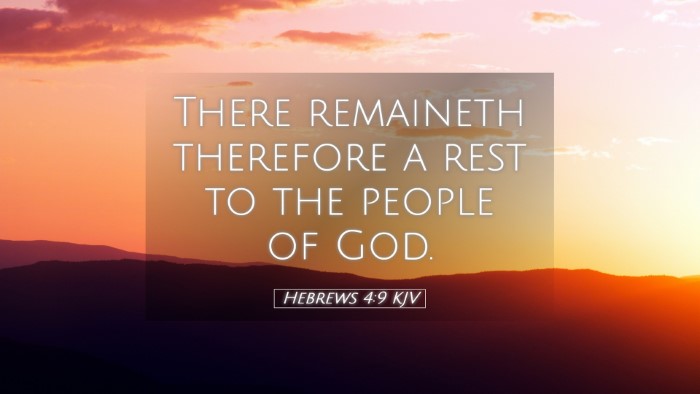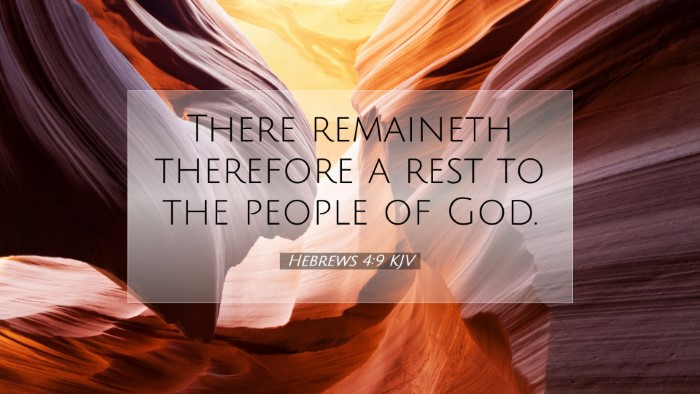Old Testament
Genesis Exodus Leviticus Numbers Deuteronomy Joshua Judges Ruth 1 Samuel 2 Samuel 1 Kings 2 Kings 1 Chronicles 2 Chronicles Ezra Nehemiah Esther Job Psalms Proverbs Ecclesiastes Song of Solomon Isaiah Jeremiah Lamentations Ezekiel Daniel Hosea Joel Amos Obadiah Jonah Micah Nahum Habakkuk Zephaniah Haggai Zechariah MalachiHebrews 4:9
Hebrews 4:9 KJV
There remaineth therefore a rest to the people of God.
Hebrews 4:9 Bible Commentary
Commentary on Hebrews 4:9
Verse: "There remaineth therefore a rest to the people of God."
Introduction
This verse serves as a culmination of the theological arguments found in the book of Hebrews, particularly concerning the concept of rest as it pertains to the believer. It draws a profound connection between the rest promised in the Old Testament and the rest that Jesus provides for His followers. The text invites deep reflection on the nature of rest from a spiritual and eschatological perspective.
Theological Implications
Hebrews 4:9 asserts that there is a divine rest that remains for the people of God, suggesting that this rest is not merely a physical or temporary state, but rather a profound spiritual reality. Matthew Henry emphasizes that this rest is a type of peace and assurance that only comes through faith in Christ, highlighting that the cessation from one's labors symbolizes a greater salvific reality.
Albert Barnes points out that this rest is best understood in the context of the eternal Sabbath provided by Christ. He notes that while the Israelites experienced a form of rest in the Promised Land, the true rest, which is complete and without strife, remains accessible to believers as part of God's redemptive plan.
Adam Clarke furthers this notion by arguing that the rest mentioned goes beyond a singular moment of peace; it encompasses the entirety of the believer's life in fellowship with God. This rest is not only present in the future eternal state but is also a current reality for those who abide in Christ.
Contrast with Old Testament Themes
The author of Hebrews frequently refers back to the experiences of the Israelites to illustrate his points. Matthew Henry suggests that when the children of Israel rebelled in the wilderness, they forfeited their entry into God's rest. This reflects the seriousness of disobedience and underscores the theological notion that entering into God's rest requires faith and obedience.
Albert Barnes elaborates by stating that God's rest is indeed a promise, yet it's contingent upon individuals responding appropriately to His call through faith. He draws a parallel between the original Sabbath and the spiritual rest offered through Jesus, symbolizing a rest that is both free from worldly toil and filled with divine presence.
Practical Application for Believers
The call to recognize the rest that remains is not only a promise of future tranquility in heaven but also an invitation to participate in a profound relationship with God presently. Adam Clarke notes the importance of experiencing this rest amid life's trials. He suggests that believers should seek to enter this rest through prayer, meditation, and a life that honors God through faithfulness.
- Faith as the Key: Acceptance of God's gift of rest is fundamentally an act of faith. Believers are called to place their trust in the sufficiency of Christ's work.
- The Role of Obedience: Engaging in a lifestyle of obedience is essential. Just as the Israelites' disobedience led to exclusions from the Promised Land, so too can disbelief hinder the fullness of God's rest in one's life.
- Living in Current Rest: This rest is accessible today through communion with God and the indwelling of the Holy Spirit, providing peace and assurance amidst life's tumult.
Conclusion
Hebrews 4:9 encapsulates a vital truth: there remains a rest for the people of God—a rest characterized by peace, assurance, and the presence of God. As believers, there is an invitation to enter into this rest, which is not only a future promise but a present reality. In a world marked by anxiety and toil, this scriptural reminder calls us to deepen our faith, embrace obedience, and live fully in the rest that Christ offers. The insights from Matthew Henry, Albert Barnes, and Adam Clarke remind us of the richness of this promise and challenge us to respond faithfully to God's invitation.


